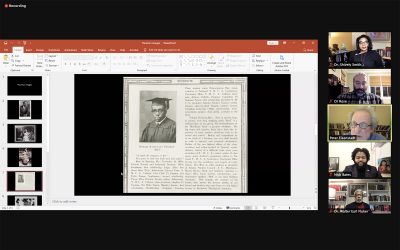The life and legacy of Howard Thurman — a religious educator, author and philosopher who devoted his life to defeating divisiveness — has played a crucial role in the development of Boston University’s social mission to promote diversity and inclusion on campus and beyond.

In reflecting this progress, the Howard Thurman Center for Common Ground hosted author Peter Eisenstadt for a talk Monday on his newly released biography of Howard Thurman: “Against the Hounds of Hell: A Life of Howard Thurman.”
The event featured a panel of contemporary theology and Thurman scholars and was co-sponsored by Hebrew College and BU School of Theology.
Eisenstadt, who is considered one of the most prominent Thurman scholars in the nation, said at the event Thurman’s work represents a broad life’s purpose, not a job.
“I have never found this work to be narrow or parochial,” Eisenstadt said. “It started as a job, it became a mission and it’s now what Thurman calls ‘[a] track to the water’s edge,’ a lifelong quest.”
Though Thurman’s still not universally well-known, Eisenstadt said the release of “Against the Hounds of Hell” last month and the five volumes of the Thurman papers — which include previously unpublished and little-known works from his lifetime released in five chronological parts — has helped spark a “Thurman renaissance,” and people want to learn more.
“I think he’s not received the recognition among African Americans that he deserves,” he said. “You tell people you’re writing a book on Howard Thurman, everybody’s like ‘who is Howard Thurman?’”
The event’s scholars focused on different aspects of Thurman’s philosophies, branching into Thurman’s views on feminism, legacy and influence, as well as the book.
Thurman’s influence on other figures also played a crucial role in Monday’s talk. Eisenstadt said abridged conceptions of Thurman, as someone who inspired Martin Luther King, Jr. or just a civil rights advocate, can often detract from his broad contributions.
“One thing I wanted to do in the book was to give a sense of how capacious he was, and how many areas he touched, without for a moment discounting his importance as a theorist of non-violence and as a forerunner to King,” he said at the event. “He can’t be limited to that, he shouldn’t be limited to that.”
Shively Smith, an assistant professor of New Testament at STH who has a Ph.D. in New Testament studies, was a panelist at the event. She said in an interview Thurman was “that person you never see, but who is behind the scenes, present with people in a real way.”
Smith said her introduction to Thurman and his work came from a personal place — she first encountered his work years ago through his meditations.
“I came to him as someone who was a part of my spiritual anchoring and spiritual voice,” she said, “which is different, I think, than how others may have come upon him by reading one of his most well-known book.”
Walter Fluker, a Martin Luther King Jr. professor emeritus of ethical leadership at STH, also spoke in Monday’s discussion.
Fluker, who coincidentally is married to Thurman’s goddaughter, his next-door neighbor, said there were occasions when he met Thurman in his family home in Atlanta.
“I’m already reading Thurman, thinking Thurman and can you imagine meeting his goddaughter, my next door neighbor?” he said. “I got a chance to know him a little personal and up close.”
However, Fluker’s first encounter with Thurman’s work, he said, was as a host chaplain’s assistant at a chapel in Fort Riley, Kansas while putting together the Sunday Mass bulletin, when he was typing the weekly meditations and realized it was the work of Thurman.
“To my amazement, I picked up the book and saw the back cover, and there was this smiling, beautiful Black man, like he was laughing away, a gleam in his eyes,” Fluker said. “I was already struck by the depth of the meditations, but to identify with someone like myself was just wonderful.”
Fluker described Thurman as “the most humorous person I ever met and the most human person I’ve ever met.” He said though he is gaining increasing recognition for his work, Fluker likes to remember him for his mission, not his fame.
The legacy of Howard Thurman was also a key talking point. Even 40 years after Thurman’s death, Smith said his work still offers people the tools to, as the name of the BU center reflects, find “common ground.”
“Thurman gives us language,” Smith said at the event. “Models in … what it means to courageously share space with each other and with others that you’re not familiar with, and then to call and to look at each other and see each other as human beings.”
For Fluker, much of Thurman’s legacy and advice has been used as a guide in his life. He recalled a story about Thurman that he never forgot — preparing to depart Evanston, Illinois to Boston in 1980 to begin his Ph.D program, Fluker wrote Thurman a letter asking for advice.
Thurman, “after a millennium,” wrote Fluker back, responding with three questions: “Who are you really?” “What do you really want?” and “How do you get what you want?”
The three questions have since influenced Fluker’s life, he said, and hopes they can have the same impact on the next generation of activists.
“Those have been guiding questions for me throughout my life, as a result of Thurman,” he said, “and they are also guiding questions, I think, for a new generation of seekers, activists, who really want to see something different in the world and in society.”
Last updated March 12 at 9:57 a.m.


























































































































